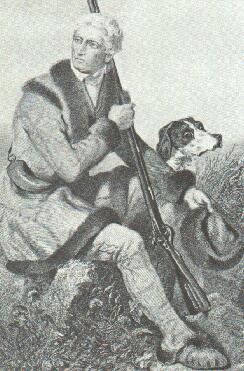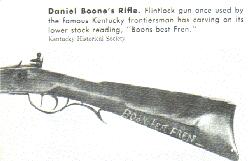Daniel Boone born October 22, 1734 was a United States pioneer and Indian fighter and instrumental in the Western Expansion. His courage in settling frontier country and his skill with the rifle have made him a legendary figure in American History. Although accounts of many of his feats may contain more legend than fact, Boone was nevertheless a skilled frontiersman who showed courage and strength. His followers found him honest, even-tempered, and modest. Boone was born near Reading, Pennsylvania, one of 11 children. He had no regular schooling, but he did learn to read and write. By the age of 12, he was an expert hunter and tracker. His family moved to the Shenandoah Valley in 1750 and the next year settled in North Carolina. Boone worked there as a teamster and a blacksmith. In 1755, during the French and Indian War, he served under General Braddock in the disastrous attempt to capture Fort Duquesne from the French. He returned to North Carolina and on August 14,1756 he married Rebecca Bryan (born January 9, 1738/39). They had 10 children: James, Israel, Susannah, Jemima, Levina, Rebecca, Daniel Morgan, Jesse Bryan, William, and Nathan. Boone In Kentucky Boone visited Florida, then made two extensive trips to Kentucky (1767-68 and 1769-71) with small groups of friends. With a group of settlers Boone set out for Kentucky in 1773, but the expedition was given up after an Indian attack near the Cumberland Mountains. In 1775 Boone was commissioned by Colonel Richard Henderson of the Transylvania Company to establish a colony in Kentucky. Boone's party blazed a trail--the Wilderness Road, or Boone's Trace-- through the Cumberland Gap and into Kentucky where they built a fort on the Kentucky River. This fort, Boonesborough, was among the first settlements in Kentucky. The Indians tried repeatedly to destroy the settlement, and many of the original settlers were killed. During the Revolutionary War the stockade withstood seiges in which the Indians were assisted by Canadians. Boone was a stirring figure in the defense of the settlement, and his fame as a woodsman and rifleman spread. During these battles on Kentucky's "dark and bloody ground," Boone and his followers lived on wild turkey, deer, and bear. They wore buckskin and slept between robes made from buffalo and deer hides. When Kentucky became a county of Virginia in 1776, Boone was made a captain in the militia. He later became a major. He was captured by Shawnees in 1778, but escaped to help defend Boonesborough. He was made a lieutenant colonel and was chosen as a delegate to the legislature in 1780, and became Fayette County sheriff and deputy surveyor in 1782. Boone fought against Indians in the bloody Battle of Blue Licks (1783), sometimes called "the last battle of the Revolution." Boone in Missouri Even before Kentucky was admitted as a state in 1792, its lands had become valuable. Boone laid claim to a number of tracks in Kentucky; his claims were never properly registered, however, and he eventually lost all the land he thought was his. In 1788 he and his family settled in what is now West Virginia. They moved to Missouri (then a Spanish territory) in 1799, settling on a Spanish land grant near St. Louis. Boone was appointed magistrate of his district in 1800, and served until the territory was ceded to the United States in 1803. Again he lost his titles to his land. He continued to work hard, however, and in 1810 was able to return to Kentucky to pay off some old debts that had troubled him. This left him almost penniless. His wife died March 18, 1813 in Saint Charles County, Missouri. In 1814 Congress restored his holdings to him in recognition of his services to the country. Daniel Boone died on September 26, 1820 in Saint Charles County, Missouri. Boone and his wife are buried in the state cemetery at Frankfort, Kentucky. Boone is named as author of "The
Discovery, Settlement, and Present State of
Kentucky" (1784), ©1991 New Standard
Encyclopedia – Standard Education Corporation –
Chicago. Daniel Boone was my 1st cousin, eight times removed. His father Squire Boone was son of George Boone III and Mary Maugridge; my 8th great-grandparents. The Lineage: 8th. George Boone III (1666-1744) m. Mary Maugridge
(1669-1740/41) ©2000 Alan
C. Freeman |

